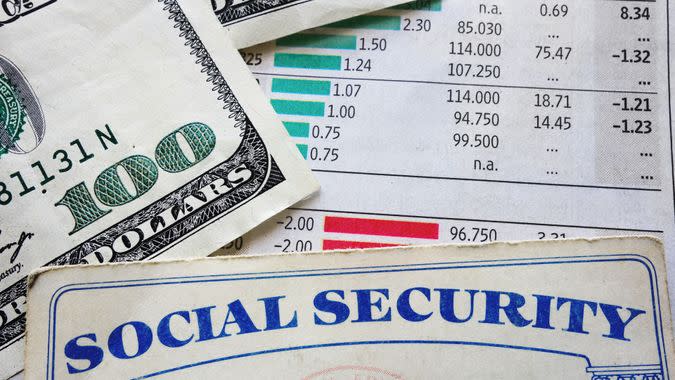Planning To Retire in 2021? Here’s What You Need To Know

You've put in decades of hard work and now you're ready to retire. Although you've likely been planning for this transition for years, there are some things you should keep in mind if you are planning to retire in 2021, given the current economic climate and government regulations.
See: 30 Greatest Threats to Your Retirement
Follow Along: 31 Days of Living Richer
To make sure you're set to start this next phase of your life, here are a few things financial experts say you need to know now.
Last updated: July 27, 2021

Be Aware of 'Catch-Up' Contribution Limits in 2021
If you're planning on making additional contributions to your retirement plans this year before beginning to cash out, be aware of the limits for 2021.
"Special catch-up contributions are allowed for individuals who are 50 years of age or over to help them boost retirement savings as they get closer to their retirement date," said Jay Shah, president of Personal Capital. "In 2021, the catch-up contribution amount for 401(k), 403(b) and some governmental 457 plans is $6,500, which brings the total contribution limit up to $26,000 for these individuals. The catch-up contribution amount for a SIMPLE 401(k) is $3,000, which brings the total contribution limit up to $16,500."
Good To Know: Hidden Obstacles That Keep People From Retirement

Aim To Have 10 Times Your Pre-Retirement Income Saved
"How much you need to have in retirement savings will vary by your lifestyle expectations and living expenses, but as a rule of thumb, aim to have 10 times your pre-retirement income saved by the time you retire," said Melissa Ridolfi, senior vice president of retirement and cash management at Fidelity Investments.
Read: How To Protect Your Retirement Savings During the Coronavirus Pandemic

Your Budget Should Include Discretionary Spending
You want to be able to enjoy your golden years, so be sure your budget includes some wiggle room for "fun" spending in addition to covering the essentials, like housing, medical expenses and food.
"Try to quantify what you think you need for retirement and do not forget to include discretionary items like travel," said Daniel Fan, senior managing director and head of wealth planning at First Foundation Advisors.
Take a Look: The Complete Guide to the Best Retirement Age

Double-Check That You Actually Have Enough Resources To Retire
You may think you're ready to retire, but it's important to double-check your finances and withdrawal plan to ensure that you are truly financially ready to leave the workforce.
"Generally, you do not want to withdraw more than 4% from your accounts in order to meet retirement goals, so determine if this is possible," Fan said. "The best possible way to determine if you have enough resources and how much you may need to save is to have a financial planner create a cash flow analysis for you."
Options: The Cost To Retire in America’s Sunniest Cities

Remember That Retirement Planning Isn't Linear
"A linear approach to calculating finances ignores the real-life complexity of subjects like inflation and investment behavior that can change substantially over time," said Daniel Ruppel, a financial planning strategist with TIAA. "A financial plan should consider how these things can change from year to year, and how a family’s goals may be affected. For example, a series of negative investment returns in the early years of retirement can have a significant impact. An approach that assumes even a conservative positive return every year is unrealistic."
Keep Reading: 50 Best (and Worst) Cities for an Early Retirement

Pay Off Your Debts First
Ideally, you will enter retirement debt-free.
"The more debt you carry into retirement the more difficult it will be to meet retirement goals, so try to pay off as much debt as possible," Fan said. "If you have a large mortgage, you may want to consider downsizing to pay off as much of the mortgage as possible."
Important: Most Tax-Friendly States To Retire

Have a Spending Strategy
"It’s important to have a strategy to spend down your savings smartly," said Amy Richardson, CFP, financial planner with Schwab Intelligent Portfolios. "A good rule of thumb is to use guaranteed income -- Social Security, pension payments, annuities, etc. -- for essential expenses like housing, car loans, food and utilities. Pay for optional expenses like vacations or gifts to grandchildren with less reliable sources of income like stock dividends, and distributions from mutual funds and ETFs."
Check Out: Jaw-Dropping Stats About the State of Retirement in America

Consider Medical Expenses Before Retiring Early
Although it may be appealing to leave the workforce before you hit 65, this can come with a hefty additional cost.
"If you want to retire before age 65, make sure you have enough resources to pay for medical insurance since you will not yet qualify for Medicare," Fan said. "These costs can be substantial, especially if you need to pay coverage for other family members."
See: Here’s Exactly How Much Savings You Need To Retire In Your State

Know Your Minimum Distribution Requirements
"The required minimum distribution rules vary based upon when you were born," said Barbara Friedberg, MBA, MS, founder of Robo-Advisor Pros. "Familiarize yourself with them, as the penalties are stiff for those who miss the deadlines. Also, review the IRS.gov COVID information to determine if this will impact your RMD."
Put More Money Away: 16 Effective Ways To Trick Yourself Into Saving Money

Have a Plan for Claiming Social Security Benefits
"It’s important for people approaching retirement to understand the impact certain Social Security decisions can have on retirement preparedness," Ridolfi said. "For example, the longer you can wait to claim Social Security, the more time there is to build savings. If you can afford to, waiting until at least you’re entitled to full Social Security benefits -- between 66 and 67 -- can help increase your monthly benefit. If you can delay claiming Social Security to age 70, your benefits can increase by 30% compared to what they would be had you claimed at age 65."
In Retirement:50 Ways To Live the Big Life on a Small Budget

Review Your Named Beneficiary Designations
"Investors saving towards retirement or those who are already in retirement should know that the recently-passed SECURE Act has changed laws regarding distribution options for named beneficiaries on retirement accounts," said Leslie Geller, wealth strategist at Capital Group. "Beyond ensuring that you have named beneficiaries, now is the time to review those designations because of the new 10-year distribution rule for inherited IRAs applicable to most non-spousal beneficiaries. This is especially relevant for investors who have significant retirement assets."
Helpful: How I’m Sticking to a Budget and Spending Less During COVID-19

Be Aware of Policy Changes That Could Come Under a Biden Presidency
President-Elect Joe Biden has announced plans for new policies that could affect those retiring this year, typically for the better.
"There are some larger policy changes afoot which the new president is championing including lowering prescription drug prices, tax relief for caregivers, tax relief for workers over 65 who remain in the workforce, increased IRA catch-up contributions, deferred RMDs and higher Social Security benefits for widows and widowers," said Rhian Horgan, founder and CEO of retirement planning app Silvur.
Read More: 25 Things You Should Never Do With Your Money

Make Sure You're Mentally Ready To Retire
You may have all your financial ducks in a row, but being mentally prepared for what this transition means is equally important.
"Since most of us receive social and psychological benefits from working, before retiring take a hard look at how you will fulfill those important needs once you're retired," Friedberg said. "You may not be ready to retire if you don't have some ideas about how you will spend your time in retirement. Since jobs for older Americans may be difficult to find, take your time before deciding to retire and consider taking a month or two of vacation and try out your retirement lifestyle."
More From GOBankingRates
Gabrielle Olya contributed to the reporting for this article.
This article originally appeared on GOBankingRates.com: Planning To Retire in 2021? Here’s What You Need To Know

